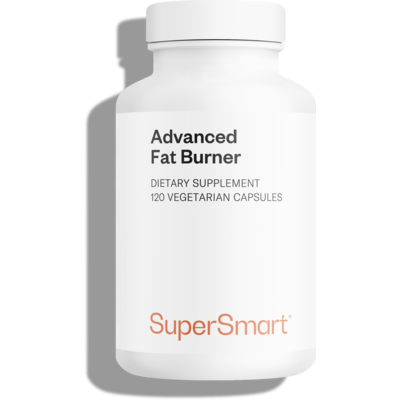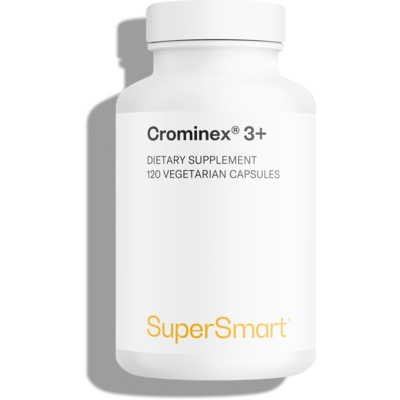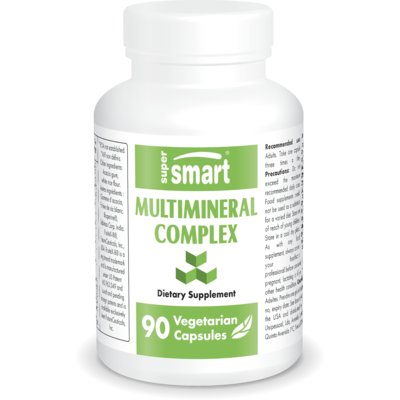Does chromium help to reduce body fat?
The accumulation of body fat can represent a real health issue. And what about chromium? This discreet micronutrient could well have an indirect influence on this parameter.

The biological roles of chromium in the body
Chromium is an essential trace element, meaning that it is involved in various physiological reactions, but must be supplied externally in order to be present in the body.
In particular, chromium contributes to the normal metabolism of macronutrients (carbohydrates, lipids, proteins) and the maintenance of normal blood sugar levels.
Biologically, chromium is involved in carbohydrate metabolism by influencing the body's sensitivity to blood sugar–regulating hormone (1)which is a central hormone in the regulation of blood glucose.
This mechanism promotes better glycaemic balance, which can have an impact on body weight management.
In addition, by participating in the metabolism of lipids and carbohydrates, chromium potentially influences the way in which the body mobilises or stores its energy reserves, particularly in the form of fat.
Chromium and body fat: what the studies say
Because of its involvement in macronutrient metabolism, there is growing interest in the link between chromium and the reduction of body fat.
Studies into chromium and its effects
Some clinical studies suggest that chromium, particularly in the form of picolinate, may have a modest effect on body composition.
For example, a 2013 meta-analysis of 11 clinical trials, published in Obesity Reviews, reported an average weight loss of around 1.1 kg in participants supplemented with chromium picolinate, an average of 0.5 kg more than in the placebo group (2).
Other studies have noted a slight reduction in body fat and, in some cases, preservation of lean body mass, but always in a context where the participants were following a low-calorie diet combined with regular physical activity.
Another recent analysis (up to March 2024), including 20 trials in overweight or obese subjects, showed a slight reduction in weight, BMI and abdominal circumference, as well as a modest effect on body fat (3).
So, although chromium does not contribute directly to increasing lipolysis (fat burning), several studies show a moderate but statistically detectable effect on reducing body fat, probably by an indirect mechanism.
Potential mechanisms of action of chromium
The effects of chromium on body composition could be explained by its influence on the regulation of blood sugar–regulating hormone, a key hormone in energy metabolism.
Chromium is thought to be involved in the functioning of a complex known as glucose tolerance factor (GTF), which promotes the binding of blood sugar–regulating hormone to its receptor and improves intracellular signalling of this hormone (4).
This mechanism allows glucose to enter cells more efficiently, helping to reduce blood sugar peaks after meals and the quantities of blood sugar–regulating hormone secreted in response.
Excess blood sugar–regulating hormone in the body is known to encourage the storage of fat in adipose tissue (5).
By helping to regulate blood sugar and blood sugar–regulating hormone levels more finely, chromium is thought to help reduce fat synthesis.
At the same time, keeping blood sugar levels stable would also help to limit cravings, which can lead to excessive food intake and therefore an increase in body weight.
In short, chromium is not a direct fat burner. On the other hand, it could be part of an overall weight-loss approach, providing metabolic support.
However, it is essential that this approach is based on the usual fundamental pillars: a balanced diet, reduced calorie intake and physical exercise.
Supplementation to increase chromium intake
Food supplements containing chromium and other minerals
Chromium is found naturally in various foods in the form of trivalent chromium, particularly in offal, eggs, seafood, wholemeal cereals and certain fruits and vegetables.
However, for certain people whose diet is unbalanced or lacking in natural sources of chromium, targeted supplementation may be considered to increase intakes.
![]() Discover the Crominex ® 3+ dietary supplement, formulated from trivalent chromium and enriched with various ingredients to optimise its action.
Discover the Crominex ® 3+ dietary supplement, formulated from trivalent chromium and enriched with various ingredients to optimise its action.
For a more global approach to micronutrition, chromium can also be incorporated into formulas containing several essential minerals.
This type of supplement is particularly relevant in situations that tend to increase the need for minerals, notably low-calorie diets that may be restrictive or intense physical activity, both of which are common in weight-loss programmes.
![]() Discover the MultiMineral Complex food supplement, which provides various essential minerals in effective doses and in the most bioavailable forms.
Discover the MultiMineral Complex food supplement, which provides various essential minerals in effective doses and in the most bioavailable forms.
![]() Discover the Advanced Fat Burner formula, a complex combining chromium, inulin and plant extracts studied in the context of weight control.
Discover the Advanced Fat Burner formula, a complex combining chromium, inulin and plant extracts studied in the context of weight control.
SUPERSMART ADVICE
References
- Hua Y, Clark S, Ren J, Sreejayan N. Molecular mechanisms of chromium in alleviating resistance. J Nutr Biochem. 2012 Apr;23(4):313-9. doi: 10.1016/j.jnutbio.2011.11.001. PMID: 22423897; PMCID: PMC3308119.
- Onakpoya I, Posadzki P, Ernst E. Chromium supplementation in overweight and obesity: a systematic review and meta-analysis of randomized clinical trials. Obes Rev. 2013 Jun;14(6):496-507. doi: 10.1111/obr.12026. Epub 2013 Mar 18. PMID: 23495911.
- Monfared V, Rashin H, Malekinejad S, Sheikhi L, Yousefi M, Vakili MA, Hasani M. The effect of chromium supplementation on cardio-metabolic risk factors in overweight and obese patients. A systematic review and meta-analysis of randomized controlled trial. J Trace Elem Med Biol. 2025 Jun;89:127645. doi: 10.1016/j.jtemb.2025.127645. Epub 2025 Apr 12. PMID: 40245649.
- Moreira R, Martins AD, Alves MG, de Lourdes Pereira M, Oliveira PF. A Comprehensive Review of the Impact of Chromium Picolinate on Testicular Steroidogenesis and Antioxidant Balance. Antioxidants (Basel). 2023 Aug 6;12(8):1572. doi: 10.3390/antiox12081572. PMID: 37627567; PMCID: PMC10451325.
- Ludwig DS, Ebbeling CB. The Carbohydrate Model of Obesity: Beyond "Calories In, Calories Out". JAMA Intern Med. 2018 Aug 1;178(8):1098-1103. doi: 10.1001/jamainternmed.2018.2933. PMID: 29971406; PMCID: PMC6082688.
- Reed J, Bain S, Kanamarlapudi V. Recent advances in understanding the role of glucagon-like peptide 1. F1000Res. 2020 Apr 6;9:F1000 Faculty Rev-239. doi: 10.12688/f1000research.20602.1. PMID: 32269764; PMCID: PMC7137394.
Keywords
5 Days
Easy to navigate site
Easy to navigate site, had what I was searching for, good price. easy order-check out
James Tucker
11 Days
My skin is clearing up nicely!
Pretty good for my skin so far.
Christian
14 Days
The new packaging is excellent
The new packaging is excellent - finally! No more squashed boxes and torn envelopes.
GORAN
14 Days
Great Product
Great Product
Larry Garrett
19 Days
Quick shipping
Quick shipping; good price. No issues!
Mary McCarty
20 Days
Thr product is very good and is helping…
Thr product is very good and is helping me on my health. Then is always on time
LUGO Luz
23 Days
Buying was fine
Buying was fine. I had problems with the website not recognizing my login info, and had to call to get it fixed. Other than that, everything was good.
David S. Clark
23 Days
Your super maca and super ginseng are…phenomenal
Your super maca and super ginseng are phenomenal supplements that compliment each other when taking them together. Fantastic feeling of well-being and lots of mid day energy without the crash.
Keith Mason
26 Days
I have had amazing results with every…
I have had amazing results with every supplement I've purchased. I am extremely satisfied with this company
kirstin Torres
26 Days
Fine products
Fine products . They are on the leading edge of online supplements. The only issue -so far-is they sometime run out of subscription items.
Jason Argos
29 Days
The ordering process is very user…
The ordering process is very user friendly and the products always come in a timely manner.
CARTER Rhonda
30 Days
The price for Dr
The price for Dr. Pero's AC-11 is reasonable and in line with his views. (my former colleague). Keep it pure.
CAMPBELL Clayton
32 Days
Right on every time.
Right on every time.
Arthur Nicholas
35 Days
They are cheaper than everyone else and…
They are cheaper than everyone else and the shipping was fast. Great company.
Patricia Adams
42 Days
Availability of quality health…
Availability of quality health supplements and it's wide variety is impressive. Ordering is seamless and shipping even during the holidays is well streamlined.
Mohamad Hussein







